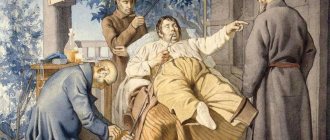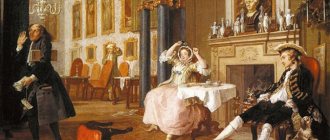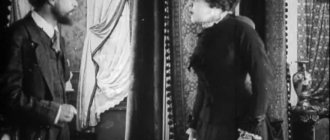History of creation and heroes of the work
Playwright Ivan Sergeevich Turgenev (1818-1883) made a significant contribution to the history of Russian literature in the second half of the 19th century. The master of words could reveal any image, be it a landscape or a complex human character. In adulthood, the playwright wrote several works that are classified as memoirs.
The story “Spring Waters” was created in 1872 and is recognized as one of the most striking and significant. It is an example of Russian classical prose of the 19th century. and talks about the regrets of a landowner who wasted his best years. As a preface to the text, the author chose lines from an ancient Russian romance:
Merry years, Happy days - They rushed by like spring waters!
A summary of “Spring Waters” makes it possible to prepare for a literature lesson and write down your own conclusions in a reader’s diary. Before getting to know the work, you should study its main and secondary characters. The main characters in the story are:
- Dmitry Pavlovich Sanin. A landowner not burdened with worries about his daily bread. Noble, but soft and weak-willed in character.
- Gemma Roselli. A beautiful Italian woman of nineteen years old who won the heart of young Sanin.
- Marya Nikolaevna Polozova. A woman who puts her desires and whims above the interests of other people.
The story features Gemma's mother Lenore, her teenage brother Emilio and the Panataleone family servant. The author also introduces Karl Klüber, the young wealthy groom of a beautiful Italian woman. On the pages of the work, readers meet Marya Nikolaevna’s husband Ippolit and Baron Dengof, with whom the hero became friends after the duel.
According to information on Wikipedia, the work has been filmed 5 times. The film, shot in 1915, has not survived. The last film was released in 1989. It is called “A Trip to Wiesbaden.” The main roles were played by Sergei Zhigunov (Sanin) and Natalia Lapina (Maria Nikolaevna).
V
Gemma listened to her mother - and now chuckled, now sighed, now stroked her on the shoulder, now shook her finger at her, now glanced at Sanin; Finally she stood up, hugged and kissed her mother on the neck - “on her darling”, which made her laugh a lot and even squeal. Pantaleone was also introduced to Sanin. It turned out that he had once been an opera singer, for baritone roles, but had long since stopped his theatrical studies and was in the Roselli family something between a friend of the house and a servant. Despite his very long stay in Germany, he learned the German language poorly and only knew how to swear in it, mercilessly distorting even swear words. “Ferroflucto spicchebubbio!” [3] - he called almost every German. He pronounced the Italian language perfectly - for he was from Sinigaglia, where one hears “lingua toscana in bocca romana!”[4]. Emilio apparently basked and indulged in the pleasant sensations of a man who had just escaped danger or was recovering; and, besides, one could notice from everything that his family spoiled him. He shyly thanked Sanin, but, however, leaned more on syrup and sweets. Sanin was forced to drink two large cups of excellent chocolate and eat a wonderful amount of biscuits: he had just swallowed one, and Gemma was already bringing him another - and there was no way to refuse! He soon felt at home: time flew by with incredible speed. He had to talk a lot - about Russia in general, about the Russian climate, about Russian society, about the Russian peasant - and especially about the Cossacks; about the war of the twelfth year, about Peter the Great, about the Kremlin, and about Russian songs, and about bells. Both ladies had a very weak concept of our vast and distant homeland; Mrs. Roselli, or, as she was more often called, Frau Lenore, even plunged Sanin into amazement with the question: does the famous ice house in St. Petersburg, built in the last century, still exist, about which she recently read such an interesting article in one of her books deceased husband: “Bellezze delle arti”? [5] And in response to Sanin’s exclamation: “Do you really think that there is never summer in Russia?!” - Frau Lenore objected that this is how she still imagined Russia: eternal snow, everyone wears fur coats and everyone is military - but the hospitality is extraordinary, and all the peasants are very obedient! Sanin tried to provide her and her daughter with more accurate information. When the talk touched on Russian music, he was immediately asked to sing some Russian aria and pointed to a tiny piano in the room, with black keys instead of white and white instead of black. He obeyed without further ado and, accompanying himself with two fingers of his right and three (thumb, middle and little fingers) of his left, sang in a thin nasal tenor, first “Sarafan”, then “On the Pavement Street”. The ladies praised his voice and music, but more admired the softness and sonority of the Russian language and demanded a translation of the text. Sanin fulfilled their desire, but since the words of “Sarafan” and especially: “On the pavement street” (sur une ruà pavee une jeune fille allait à l'eau[6] - this is how he conveyed the meaning of the original) - could not inspire his listeners with a high concept of Russian poetry, he first recited, then translated, then sang Pushkin’s “I remember a wonderful moment,” set to music by Glinka, the minor verses of which he slightly distorted. Here the ladies were delighted - Frau Lenore even discovered amazing similarities in the Russian language with Italian. “A moment” - “o, vieni” [7], “with me” - “siam noi” [8] - etc. Even the names: Pushkin (she pronounced: Poussekin) and Glinka sounded something familiar to her. Sanin, in turn, asked the ladies to sing something: they also did not bother. Frau Lenore sat down at the piano and, together with Gemma, sang several duettinos and stornellos. My mother once had a good contralt; The daughter's voice was somewhat weak, but pleasant.
Summary
Getting acquainted with a brief retelling of the story “Spring Waters” by Turgenev takes about 5 minutes. When you have free time, it is better to read the full text (44 chapters) with annotations. It will take 45 minutes. From the first lines, the nobleman Sanin appears before the reader at the age of 52. He accidentally finds a garnet cross among his personal belongings and remembers the events associated with it.
At the age of 22, young Dmitry traveled around Europe. On the way back from Italy to Russia, he stopped in Frankfurt. The hero was not burdened with a family and did not have much capital. With funds received after the death of a distant relative, he decided to travel a little before settling into government service.
Having accidentally entered an Italian pastry shop, the hero met its owners - the Roselli family. He helped Gemma when her brother Emil became ill. For this, everyone was very grateful to him and offered to stay with them for a few days. Dmitry was fascinated by Gemma, her freshness, purity, cherry lips and the gloss of her wavy hair. His feelings became mutual. The girl was betrothed, but refused the groom. This was a blow to Gemma’s mother, who hoped to improve the business of the confectionery at the expense of her future son-in-law Karl Kluber.
Sanin decided to help the Italian family and for this he hastened to sell the estate. He found a buyer in the person of Marya Polozova, the wife of his old acquaintance. At that time she was in the German city of Wiesbaden. The rich woman led a free lifestyle and easily seduced Sanin. Having played with him enough, she left him without regret and went to Paris to meet new impressions. Gemma found out about the betrayal and could no longer trust her lover.
Dmitry wondered for a long time how it happened that he forgot his beloved and found himself under the influence of a strange woman. He returned to Russia and plunged into routine, gradually forgetting about what had happened. In memory of his beloved, he only had a garnet cross. Having stumbled upon him by chance, Sanin wanted to find out how Emma’s fate turned out, and he succeeded.
Arriving again in Frankfurt, he learned that the woman had moved to New York, was living in a happy marriage and raising five children.
The eldest daughter looks like her mother and is planning to get married soon. Sanin sent the girl a garnet cross as a gift. Returning to Russia, he decided to hastily sell the property he had acquired over the years and go to America.
II
A girl of about nineteen, with her dark curls scattered over her bare shoulders and her bare arms outstretched, rushed into the pastry shop and, seeing Sanin, immediately rushed to him, grabbed his hand and pulled him along, saying in a breathless voice: “Hurry, hurry, here, save me!” Not out of unwillingness to obey, but simply from an excess of amazement, Sanin did not immediately follow the girl - and seemed to stop in his tracks: he had never seen such a beauty in his life. She turned around - and with such despair in her voice, in her gaze, in the movement of her clenched hand, convulsively raised to her pale cheek, she said: “Yes, go, go!” - that he immediately rushed after her through the open door.
In the room where he ran after the girl, lying on an old-fashioned horsehair sofa, all white - white with yellowish tints, like wax or like ancient marble - a boy of about fourteen, strikingly similar to the girl, obviously her brother. His eyes were closed, the shadow of his thick black hair fell like a spot on his petrified forehead, on his motionless thin eyebrows; Clenched teeth were visible from under his blue lips. He didn't seem to be breathing; one hand fell to the floor, he threw the other behind his head. The boy was dressed and buttoned up; a tight tie squeezed his neck.
The girl screamed and rushed towards him.
- He died, he died! - she cried, - now he was sitting here, talking to me - and suddenly he fell and became motionless... My God! is it really impossible to help? And no mother! Pantaleone, Pantaleone, what about the doctor? “- she suddenly added in Italian: “Have you gone to see the doctor?”
“Signora, I didn’t go, I sent Louise,” a hoarse voice came from behind the door, “and a little old man in a purple tailcoat with black buttons, a high white tie, short nankeen trousers and blue woolen stockings entered the room, hobbling on crooked legs. His tiny face completely disappeared under a whole mass of gray, iron-colored hair. Rising steeply upward on all sides and falling back in disheveled braids, they gave the old man’s figure a resemblance to a tufted hen - a resemblance all the more striking because under their dark gray mass all that could be seen was a pointed nose and round yellow eyes.
“Louise is quickly running away, but I can’t run,” the old man continued in Italian, one by one raising his flat, gouty legs, shod in high shoes with bows, “but I brought water.”
With his dry, gnarled fingers he squeezed the long neck of the bottle.
- But Emil will die for now! – the girl exclaimed and extended her hands to Sanin. - Oh my lord, oh mein Herr! Can't you help?
“We need to bleed him - this is a blow,” remarked the old man, who bore the name Pantaleone.
Although Sanin did not have the slightest idea about medicine, he knew one thing for sure: blows do not happen to fourteen-year-old boys.
“It’s a fainting spell, not a blow,” he said, turning to Pantaleone. - Do you have brushes?
The old man raised his face.
- What?
“Brushes, brushes,” Sanin repeated in German and French. “Brushes,” he added, pretending to be cleaning his dress.
The old man finally understood him.
- Ah, brushes! Spazzette! How not to have brushes!
- Let's get them here; We will take off his coat and begin to rub it.
- Okay... Benone! Shouldn't you pour water on your head?
- No... after; Now go quickly and get the brushes.
Pantaleone put the bottle on the floor, ran out and immediately returned with two brushes, one head brush and one clothes brush. A curly poodle accompanied him and, vigorously wagging his tail, looked with curiosity at the old man, the girl and even Sanin - as if wanting to know what all this anxiety meant?
Sanin quickly took off the coat from the lying boy, unbuttoned the collar, rolled up the sleeves of his shirt - and, armed with a brush, began scrubbing his chest and arms with all his might. Pantaleone just as diligently rubbed his other head brush over his boots and trousers. The girl threw herself on her knees near the sofa and, grabbing her head with both hands, without blinking a single eyelid, she glared at her brother’s face. Sanin rubbed it himself, and he himself looked sideways at her. My God! what a beauty she was!
Analysis for a reader's diary
Turgenev's story is dedicated to first love, which leaves a memory for a lifetime. The author does not describe the details of the story, without trying to veil the love triangle. The reader is captivated by events that continued 30 years later. Every character, major or minor, is important. The author also skillfully uses symbols that remain in the readers’ memory for a long time:
- During one of their romantic walks, Sanin and Gemma meet the girl's fiancé. He treated the bride very rudely, for which Dmitry challenged him to a duel. The Italian woman responded by giving the young man a rose - a symbol of love, as pure and bright as the girl’s soul.
- A little later, another gift awaited Sanin - an iron ring. After some time, he saw the same accessory on another man’s finger. Most likely, he was also among the admirers of the immoral lady.
After playing with Sanin, the rich woman abandoned the hero. Disappointed in love, the man continued his life's journey. He made a good fortune and almost forgot about the past. It overtook him by accident. The garnet cross, a gift from young Gemma, awakened memories, made her remember everything and bitterly regret the lost happiness.
Characteristics of Sanin's action
Critics reacted differently to the work. Many reproached the author for showing the negative sides of Russian people, while presenting foreigners as honest and noble. However, the overwhelming majority highly appreciated the work, its color, the personal qualities of the characters, and the accents created.
Considering the hero’s actions in relation to Gemma, one should note the weak-willedness and gentleness of his character. In adulthood, he wrote a letter from Frankfurt to New York, where he described his life as joyless and faceless. However, were Gemma and Marya Nikolaevna to blame for this?
The Italian, inexperienced in love, believed in the sincerity of Dmitry’s feelings, their purity, strength, and steadfastness. Sophisticated Polozova is used to getting everything she wants at the moment. The hero was unable to correctly assess the situation and allowed himself to be manipulated.
Perhaps the fatal choice was also influenced by the good financial situation of the married lady. Wanting to sell the estate, the hero found himself dependent on the whims of a socialite. He often remained alone with her, not wanting to cause dissatisfaction or be refused a purchase. She sought to command them, because in childhood “I had seen a lot of slavery and suffered from it.”
A well-educated and wealthy nobleman-intellectual lost everything due to lack of will and a clear position in life. However, even in our time we often encounter people with a weak-willed character. This manifests itself not only in the area of personal and family relationships, but also in the profession. At first, citizens say one thing and begin to act, but then they change plans to suit circumstances.
It is easy to draw a conclusion about Turgenev’s work “Spring Waters” after familiarizing yourself with the plot. To prevent life from rushing away without a trace, like a babbling spring stream, you need to understand your true desires, listen to them and follow the intended path. You cannot give in to momentary temptations, no matter how tempting they may seem at the moment.



